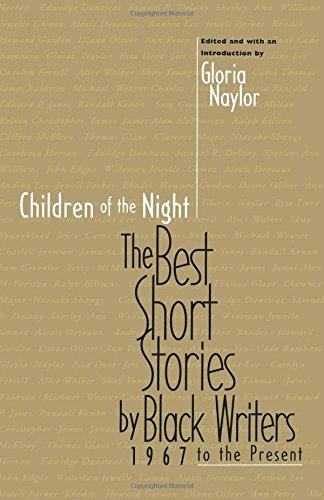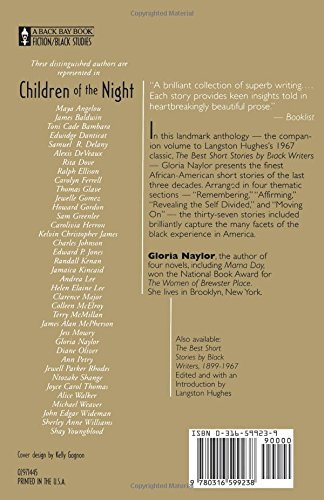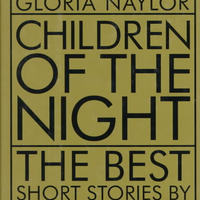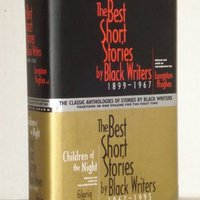-
Title
-
Children of the Night: The Best Short Stories by Black Writers 1967 to the Present
-
This edition
-
"Children of the Night: The Best Short Stories by Black Writers 1967 to the Present." Ed. Gloria Naylor. Boston: Little, Brown, 1995. xx+569 pp.
-
Table of contents
-
● Editor's Note
● Acknowledgments
● Introduction: Children of the Night
Part I: Remembering . . .
Slavery
● Samuel Delaney / The Tale of Gorgik (1979)
● Sherley Anne Williams / Meditations on History (1980)
● John Edgar Wideman / Damballah (1981)
● Jewelle Gomez / Louisiana: 1850 (1991)
A Personal Past
● Alexis DeVeaux / Remember Him a Outlaw (1972)
● Andrea Lee / Mother (1984)
● Jewell Parker Rhodes / Long Distances (1989)
● Howard Gordon / After Dreaming of President Johnson (1992)
The Changing Times
● Diane Oliver / Neighbors (1967)
● Ann Petry / The Witness (1971)
● Maya Angelou / Steady Going Up (1972)
● Toni Cade Bambara / The Lesson (1977)
● Gloria Naylor / Kiswana Browne (1982)
Part II: Affirming . . .
The Family
● Rita Dove / Second-Hand Man (1985)
● Jess Mowry / Crusader Rabbit (1988)
● Helen Elaine Lee / Silences (1990)
● Carolyn Ferrell / Proper Library (1993)
The Faith
● Alice Walker / The Diary of an African Nun (1973)
● Shay Youngblood / In a House of Wooden Monkeys (1989)
● Joyce Carol Thomas / Reverend Zelma Lee Moses (1990)
The Self
● James Baldwin / Tell Me How Long the Trian's Been Gone (1968)
● Michael Weaver / By the Way of Morning Fire (1983)
● Charles Johnson / China (1986)
Part III: Revealing the Self Divided . . .
We Who Have
● Jamaica Kincaid / Blackness (1983)
● Edward P. Jones / Lost in the City (1992)
● Randall Kenan / Run, Mourner, Run (1992)
We Who Have Not
● Sam Greenlee / Blues for Little Prez (1973)
● Terry McMillan / Ma'Dear (1990)
● Kelvin Christopher James / Transaction (1992)
Them and Us
● James Alan McPherson / A Loaf of Bread (1972)
● Ralph Ellison / Backwacking, a Plea to the Senator (1977)
● Colleen McElroy / The Woman Who Would Eat Flowers (1990)
● Thomas Glave / --And Love Them? (1993)
Part IV: Moving On . . .
Breaking New Ground
● Clarence Major / An Area in the Cerebral Hemisphere (1975)
● Ntozake Shange / oh she gotta head fulla hair (1978)
● Carolivia Herron / That Place (1987)
Launching the Future
● Edwidge Dondicat
Biographies
-
Anthology editor(s)' discourse
-
● Dedication: "For My People" : "Let a new earth rise. Let another world be born. Let a bloody peace be written in the sky. Let a second generation full of courage issue forth; let a people loving freedom come of growth. Let a beauty full of healing and strength of final clenching be the pulsing of our spirits and our blood. Let the martial songs be written, let the dirges disappear. Let a race of men now rise and take control." -- Margaret Walker
-
Reviews and notices of anthology
-
● [Review]. "Kirkus Reviews" (1 Feb. 1996): "Prize-winning novelist Naylor has assembled an impressive collection of 41 [sic, actually 37] contemporary African-American stories that range in subject matter across black history. Organized around historical motifs in African-American writing—``Remembering,'' ``Affirming,'' ``Revealing the Self Divided,'' and ``Moving On''—Naylor's collection gives spiritual coherence to the black experience, with its best stories amplifying this coherence in dazzling ways: John Edgar Wideman's ``Damballah,'' a meditation on paternity in the African tradition; Ralph Ellison's ``Backwacking, A Plea to the Senator,'' a riotously cryptic satire on white racism; and Terry McMillan's ``Ma' Dear,'' a loving sketch of an indefatigable black matriarch. Slavery and its legacy are also charted in a brilliant allegory by science fiction writer Samuel Delaney, ``The Tale of Gorgik,'' and a typically poignant talk (``Meditations on History'') by historical realist Sherley Anne Williams. Among the distinguished but lesser-knowns are Colleen McElroy's touching ``The Woman Who Would Eat Flowers'' and Jess Mowry's quixotic, disturbing, experimental ``Crusader Rabbit.'' This collection's greatest reward, however, is its inclusion of unheralded fine work by the likes of Jewelle Gomez, Thomas Glave, and Edwidge Danticat. Naylor's selections are solid and eclectic, buttressed with brief biographical sketches of contributors. In style, voice, temper, and tone, then, a wonderfully diverse contribution to the renaissance in black short-story writing."
-
● [Review]. "Publisher's Weekly" (29 Jan. 1996): "The ``best'' short stories seems an oddly cliquish categorization for any treasury of African American writing, if only because black authors have long expressed displeasure at their own exclusion from the canon. Yet this superb collection lives up to its billing; the 37 stories unabashedly depict the great diversity of black life. Compiled by Naylor (The Women of Brewster Place), the anthology includes such familiar names as Alice Walker, Maya Angelou, Charles Johnson, Ralph Ellison, Jamaica Kincaid and Ntozake Shange, and such relative newcomers as Edwige Danticat. In their tales, characters normally found in the wings of fiction move to center stage, and some conventional literary perspectives (as perceived by white Americans) are turned inside out. In the stories about slavery, literature challenges mythical history as a source of authority about the past. Sherley Anne Williams's ``Meditation on History'' is by turns ironic and heartrending in its account of a slave uprising from the points of view of the aggrieved, patronizing master and the desperate slaves. Likewise, depictions of plantation life by John Edgar Wideman, Samuel Delaney and Carolivia Herron explode the nostalgic myth of gentility and loss exemplified by Gone with the Wind. James Baldwin's ``Tell Me How Long the Train's Been Gone,'' as well as coming-of-age narratives by Toni Cade Bambara and Harold Gordon, features protagonists looking back to that moment when their vague, pervasive uneasiness culminates in bitter recognition of disenfranchisement. Freed from ideological constraints, many of the writers lead their characters bravely through the shadowy realm of racial ambivalence. The collection, in fact, highlights an African American tradition that has itself come of age, one that is poised to irrevocably alter the country's literary sensibilities. (Feb.)"
-
● Pate, Nancy. "Black Writers Explore Timeless Subects." "Chicago Tribune" 21 Feb. 1996: "An elderly widow who takes in boarders to make ends meet. A gay teenager who tries to ignore the taunts of fellow students. A young slave who recalls the murder of her lover at the hands of their owner.
"Each takes center stage in a short story in the new anthology "Children of the Night: The Best Short Stories by Black Writers, 1967 to the Present." As editor Gloria Naylor writes, 'Too often we think that there is something called the black experience. . . . We are not a monolithic people; in this anthology you will find several black experiences.'
"In fact, one of the most striking aspects of this impressive book is its variety of voices. Thirty-seven writers are represented, from the late James Baldwin and Ralph Ellison to newcomers Carolyn Ferrell and Edwidge Danticat.
"'Children of the Night' is a companion volume to 'The Best Short Stories by Black Writers: 1897-1967,' edited by Langston Hughes and published by Little, Brown in 1969. Although the stories in 'Children of the Night' were written in the post-civil rights era, the issues they explore are timeless--family and faith, survival and the search for self. Naylor has arranged the stories thematically so a reader can see how different writers approach the same subject.
"In 'Meditations on History,' for example, Sherley Anne Williams compellingly chronicles the story of the pregnant slave Odessa in a series of diary entries by a white teacher curious as to how Odessa came to be involved in an uprising in which several people were killed. Jewelle Gomez's 'Louisiana: 1850' also concerns a runaway slave involved in an act of violence, but elements of magical realism glide through its passages.
"Violence haunts other stories as well. In Ann Petry's 'The Witness,' for example, a black English teacher in his 60s is shamed into flight after he is forced to watch a gang rape by a group of white delinquents. But many of the stories are life-affirming, like Joyce Carol Thomas' lyrical "Young Reverend Zelma Lee Moses." Zelma Lee is a young singer in Sweet Earth, Okla., "a jubilee all by herself" who promises the congregation of Perfect Peace Baptist Church that she's going to fly on Easter Sunday. When she fails to take flight, she is chased from the church. "The last thing Daniel saw was Zelma's left foot, looking like a wing, as she slipped further into the piney woods." What happens next is no surprise to elderly Mother Augusta, who understands all about souls flying.
"As Naylor writes in her introduction, these stories 'are collected as examples of affirmation: of memory, of history, of family: of being.'" [full text]
-
Item Number
-
A0453







